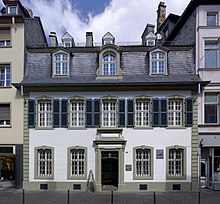Karl Marx House

The Karl Marx House museum (Template:Lang-de) is a writer's house museum in Trier (Rhineland-Palatinate, Germany). In 1818, Karl Marx, the father of modern socialism and communism, was born in the house. It is now a museum about Karl Marx's life and writings as well as the history of communism.
History
The significance of the house went unnoticed until 1904, at which point the Social Democratic Party of Germany (SPD) worked hard to buy it, succeeding in 1928. After the Nazi Party came to power in 1933, the building was confiscated and turned into a printing house.
On 5 May 1947 the building was opened as a museum of the life and works of Karl Marx. In 1968 it was integrated into the Friedrich Ebert Foundation, a charity foundation closely aligned with the SPD. On 14 March 1983, the 100th anniversary of Marx's death, the museum was re-opened after a year-long renovation that expanded it to three floors.
In 2005, the Karl Marx House museum was again closed for three months. The re-inauguration, on 9 June, was attended by such celebrities as Anke Fuchs, Franz Müntefering, Kurt Beck, and Helmut Schröer. The exhibition now also includes the history of communism in the Soviet Union, China, Central and Eastern Europe. The Karl Marx House museum currently receives about 32,000 visitors a year, about a third of whom are tourists from China, for whom it is one of the main attractions in Germany.
External links
49°45′14″N 6°38′08″E / 49.75389°N 6.63556°E
